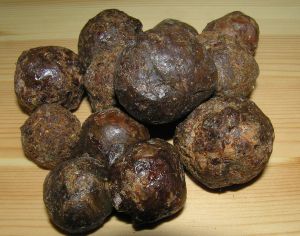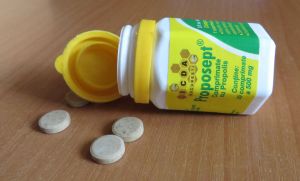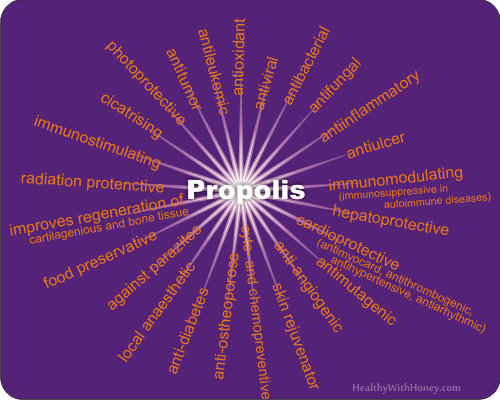 Also known as “Russian penicillin” or “bee glue”, propolis is a sticky resinous, whitish or brownish substance with antiseptic, antimicrobial, and detoxifying properties.
Also known as “Russian penicillin” or “bee glue”, propolis is a sticky resinous, whitish or brownish substance with antiseptic, antimicrobial, and detoxifying properties.
This substance is made by the bees which collect vegetal resins from the buds of certain trees (such as poplars) and cone-bearing trees, with their mandibles, and then mix it with saliva.
The name comes from the Latin “pro” meaning forward, and the Greek “polis” meaning citadel, town. The bees use it to coat the inside of the hive with it, fill the gaps and cracks. This coating prevents the spreading of microbes and fungi and thus protects the colony over the winter. Also to protect it from mousse, lizards and other insects. The pests that entered the hive are first injected with venom and then “packed” and “embalmed” in propolis. It has been showed that such a packed dead body can resist up to 5-6 years without altering.
After propolis was collected by the beekeepers, its biologic activity decreases to half in the first 4-5 hours, and disappears completely in 1-2 years after it was collected from the hive.
• Composition of propolis
• Propolis can prevent and treat LEUKEMIA and CANCER
• Brazilian Green Propolis health benefits
• Propolis protects liver, has anti-radiation effect, boosts immunity and has anti-inflamatory activity.
• Is propolis antibacterial? Can it kill bacteria, viruses, fungi or parasites?
Propolis is never the same
Propolis is normally dark brown in color, but there are also green, red, black, and white hues. This happens because the plants that are harvested by bees are so different, and the composition of propolis will never be the same. It depends on season, weather, geographical region, even from hive to hive.
· In northern temperate climates, propolis is made of resins from poplars and conifers (the biological role of resin in trees is to seal wounds and defend against bacteria, fungi and insects).
This kind of propolis has approximately 50 constituents, primarily resins and vegetable balsams (50%), waxes (30%), essential oils (10%), and pollen (5%). It also contains persistent lipophilic acaricides, a natural pesticide that deters mite infestations.
· In neotropical regions, besides a large variety of trees, bees also gather resin from flowers, especially from the genera Clusia and Dalechampia, which are the only known plant genera that produce floral resins to attract pollinators. Clusia resin contains polyprenylated benzophenones.
– in some areas of Chile, propolis contains viscidone, a terpene from Baccharis shrubs;
– in Brazil, the red propolis contains naphthoquinone epoxide and prenylated acids such as 4-hydroxy-3,5-diprenyl cinnamic acid. This red propolis is largely derived from the resin of Dalbergia ecastaphyllum and has high relative percentages of the isoflavonoids 3-hydroxy-8,9-dimethoxypterocarpan and medicarpin.
– in China, Henan, propolis has sinapinic acid, isoferulic acid, caffeic acid, andchrysin, with the first three compounds demonstrating antibacterial properties.
– in New Zealand, caffeic acid phenethyl ester (CAPE) is also a component of some varieties of propolis.
Considering the low suggested intake of 200 mg per day, propolis has an
INSIGNIFICANT CONTRIBUTION to the daily requirements regarding the basic nutrients.
(it contains: Proteins: max 1 g/100 g; Carbohydrates: max 1 g/100 g; Fat: max: 1 g/100 g)
Where do we find propolis?

– in tablets: Especially in North America and Europe, propolis is found in form of tablets, combined with a variety of other ingredients. They are sold as natural supplements and herbal medicines. I personally take them to treat my sore throat. It always, but always, helps.
– as ingredient: Propolis is also used as an additive to skin lotions, beauty creams, soaps, shampoos, lipsticks, chewing gums, toothpaste, mouthwashes and even sunscreens.
– as tincture: 20-30 g of propolis is soaked in 100 ml ethylic alcohol (of 80-900)and let to macerate for 1-2 months. It is kept in brownish glass bottles, just like the raw propolis. Away from heat, sunlight, moisture and contamination sources. It is used as treatment for sore throats, cuts and skin rashes, but also internally to treat gastrointestinal problems and bust the immune system.
– raw: the beekeepers use a heating source, like the hair-dryer, to form bars

– as hydrous solution: The producers put 50 g propolis into 200 ml water and boil it in a ceramic pot, at low temperature until the content is reduced by half. Then it is strain, put into bottles and keep like tinctures. Its validity is 2-4 weeks in the refrigerator or 5-10 days at room temperature.
– syrup: the syrup is obtained by mixing 40 g hydrous solution, immediately after preparation, with 60 g honey. It is kept in the same conditions as raw propolis and it last up to 2-4 months.
Therapeutic use of propolis:

Propolis contains over 200 substances, active from the therapeutic point of view: essential oils, 
– cuts and burns, other skin problems, even genital herpes: propolis is used as an antiseptic wash or salve, that prevents the growth of bacteria. It promotes the healing process in lesions of the skin that have not healed.
– bad breath, gingivitis, tooth decay and gum disease. If used as a mouthwash it is able to prevent them. And to speed the healing following oral surgery.
– canker sores
– infections caused by bacteria (including tuberculosis), viruses (including flu, H1N1 “swine” flu, and the common cold), fungus, and by single-celled organisms called protozoan.
– sore throats, even cancer of the nose and throat.
– immune system used for boosting it.
– gastrointestinal (GI) problems including Helicobacter pylori infection in peptic ulcer disease.
– arthritis, boils, acne, asthma, dermatitis, ulcers, and inflammatory bowel diseases. Propolis acts like an anti-inflammatory factor and thus helps with the symptoms of these diseases.
– cancer: Propolis has antimutagenic effects, which may aid in the prevention of cancer.
– chemo and radiation therapies: In combination with royal jelly, it can ameliorate their side effects.
Side Effects:
The golden rule applies here as well, no matter how good it is, the common sense should be our leader. Follow it!
It is better not to administrate large quantities. It has been observed that in time, the beekeepers’ hands became extremely irritated causing painful cracks in the skin.
Propolis is not recommended in cases of severe cardiac problems, kidney failure and liver disease jaundice.
Also, some experts say it is better to stay away from propolis if we have astma, there are some chemicals in it, that can make it worse. And they also say it’s better to avoid it in pregnancy and breast-feeding.
Don’t use propolis if you are allergic to bee by-products including honey, conifers, poplars, Peru balsam, and salicylates.
• How should we take propolis?
What’s the price of propolis?
Propolis is used more outside of the U.S. The price of propolis varies greatly from country to country. In the U.S. and Canada wholesale prices are low, varying from US$4.50-US$13 per kg. But in New Zealand, where propolis is more widely used, it is US$57 per kg.
Nowadays, when we witness an expanding of health food awareness, the future of propolis will growth and people will benefit from it entirely.
A bit of history:
Propolis has a long history of medicinal use, dating back to 350 B.C., the time of Aristotle and discussed in detail by Pliny, the Roman naturalist. Greeks have used propolis for abscesses; Assyrians have used it for healing wounds and tumors; and Egyptians have used it for mummification.
Recommended books:
• A very well written book, easy to read, that will surely answer many of your questions: The Bee Propolis Supplement: Alternative Medicine for a Healthy Body (Health Collection)
• Also on Amazon, a good informative book written by Eugene M Munro: Treatment With Propolis
Don’t have a kindle? I bet you have a smartphone! You can read it from it, whenever you have some free time. Download the app for free on your phone, and start reading what you like.
Click the long banner below:
Related articles:
Propolis can prevent and treat LEUKEMIA and CANCER
Propolis is a natural supplement for asthma management.
The truth about psoriasis natural treatments: honey, propolis, bee venom or other natural products.
Propolis treats otorhinolaryngologic and respiratory diseases
Propolis: a natural treatment for oral health
Is propolis antibacterial? Can it kill bacteria, viruses, fungi or parasites?
|
|
References:
Fanica-Voinea Ene: Natural Therapy Guide;
http://www.webmd.com;
http://mainebee.com/articles/hive_products.php;
http://www.famillemichaudapiculteurs.com/Propolis.html;
http://en.wikipedia.org/wiki/Propolis





